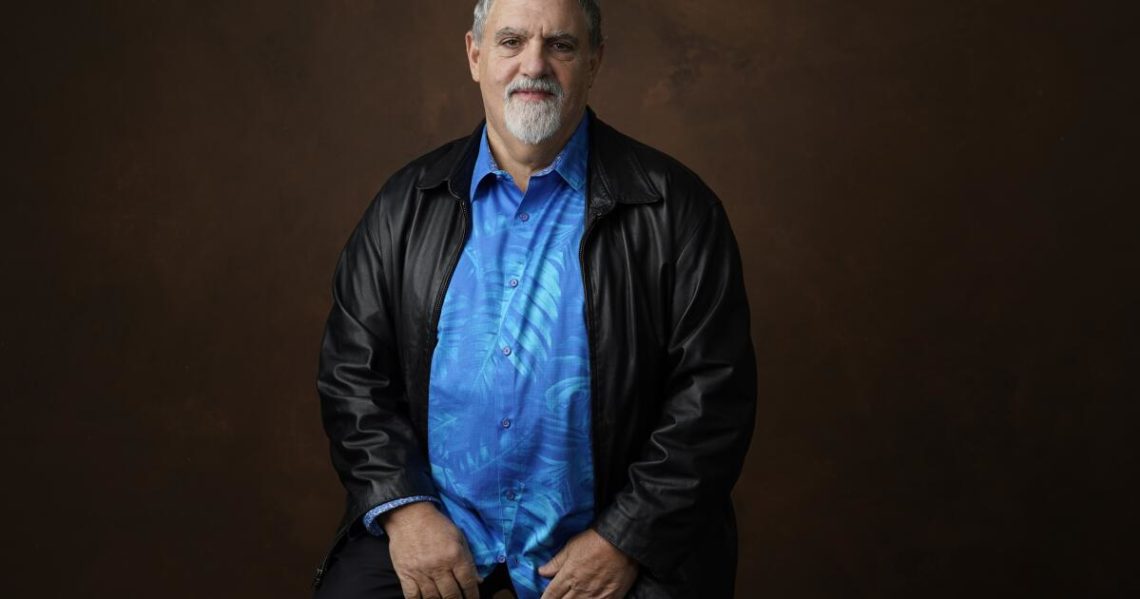Jon Landau was a problem solver.
When the ship prop for the “Titanic” wouldn’t sink fast enough, the Oscar-winning producer jumped into action, assembling a team of workers who cut, welded and removed solid floors and replaced them with mesh — all over the course of a weekend.
“By the start of shooting on Monday, that sucker sank,” director and writer James Cameron, Landau’s longtime collaborator, wrote in the foreword to Landau’s new book. “Boy, did it sink. It scared the crap out of us.”
Solving problems like a too slow sinking ship is all part of being a producer, Landau wrote in his posthumously published memoir, “The Bigger Picture: My Blockbuster Life & Lessons Learned Along the Way,” released Tuesday.
Just as important is creating an environment where each crew member was seen and heard — a key part of Landau’s producing philosophy.
He would learn everyone’s name, as well as that of their spouse and whether they had children. He gave out copies of “The Little Engine That Could” picture book to encourage the “Titanic” department heads to keep going, despite the many practical and budgetary stresses they faced. He dressed up as Mr. Potato Head and strolled the decks of the “Titanic” set to make people laugh, said Rae Sanchini, executive producer of “Titanic” and president of Lightstorm Entertainment, who was close friends with Landau.
“He loved giving people a little joy in their day,” Sanchini said, remembering Landau’s irreverent family Christmas cards. “I think it’s part of the reason why he wanted to write the book, because I think he wanted to show that even when you’re facing something like he was facing, there was still a reason to feel joyful. It was an important thing for him to leave for his family and for his friends.”
The “Titanic” and “Avatar” producer died last year of esophageal cancer at the age of 63. Landau writes that he began his book project after he got his diagnosis as a way to take stock of his life, both for himself as well as the next generation.
“If I had the chance to write my own legacy, I hope it would be that I always gave 110%,” he writes toward the end of the book. “Although not perfect, I hope people can say that I tried to do right by everybody. What more is there?”
Landau’s sister, Kathy, remembers her brother reflecting on that legacy shortly before “Titanic” opened in 1997, a fraught time for the film as critics questioned whether it would succeed. (It would go on to become one of the biggest blockbusters of all time, as would two of Landau’s other films with Cameron, 2009’s “Avatar” and 2022’s “Avatar: The Way of Water”)
“He said to me, ‘You know, Kat, I may not go down as one of the most successful producers in Hollywood, but I’d like to be remembered as one of the nicest,’” Kathy Landau said in an interview. “And I would just say, as of now, he got two for two.”
Here are four takeaways from the memoir.
Lessons from a first set
As the child of film producers Ely and Edie Landau, Jon Landau was raised around the movies.
He enrolled in USC’s film program, but never graduated. Instead, to help his family after his father had a stroke, he got a job in Hollywood, working as a “walkie-talkie guy” on the set of a TV movie called “Found Money.”
His main job was to hand out, collect and recharge the portable radios each day on set, but over the course of filming, he asked questions about all aspects of the film business, from Screen Actors Guild rules to call sheets, extras and production reports.
By the time postproduction rolled around, Landau was asked to compile all the contracts, organize and file them.
“I read every clause, rider, exemption,” he wrote. “It was the best education in the movie business a person could get. I learned more about the behind-the-scenes workings in those few weeks of computer inputting than I have learned anywhere else.”
Meeting James Cameron
Landau first met Cameron in 1993 when Cameron was directing the Arnold Schwarzenegger and Jamie Lee Curtis-led “True Lies” and Landau was a studio executive at 20th Century Fox.
Cameron needed more money for the movie, and Fox, which had the U.S. distribution rights, agreed, but insisted the studio get more involved. Landau was told to go out to the set and “try to manage James Cameron, as best as possible,” based on his previous success working with Warren Beatty and Michael Mann, he wrote.
In their first meeting in a conference room at Fox, Cameron walked straight past studio executives, stars and his producers and stopped right at Landau’s chair.
“Standing over me with his six-foot-three frame, he said, ‘So, Jon, I understand we are either going to get to be pretty good friends … or bitter enemies,’” Landau wrote. “‘Pretty good friends, I hope,’ I responded. Thirty-plus years later, I don’t have to tell you which one was the case.”
Landau also credits Sanchini with helping him understand and “adeptly navigate the world of James Cameron,” and for being “instrumental” in convincing Cameron he was the right producer to take on “Titanic.”
Making a blockbuster during the pandemic
In March 2020, Landau and the rest of the “Avatar” team was set to fly back to New Zealand to finish shooting the next two “Avatar” movies when the pandemic hit. Landau called Disney film chief Alan Bergman to tell him that they should delay production, to which the studio agreed.
Landau began doing town hall meetings over Zoom with all of the “Avatar” crew in groups of 20 at a time. He wrote that he traded in his signature Hawaiian shirts for “a closet full of crazy T-shirts, all emblazoned with messages that encouraged people to wash their hands and mask up.”
Eventually, the New Zealand government gave the production permission to bring 33 people to the country by the end of May 2020, making “Avatar” one of the first large-scale productions back in action since the pandemic had started.
Crew members were quarantined at a hotel, confined to their rooms with food delivery with clean towels and sheets left outside their doors. The production also hired more than 100 New Zealand workers for every U.S. crew member they brought in, employing local electricians, construction workers, caterers and carpenters, Landau wrote.
“Long before COVID struck, we had made a commitment to be a good partner to the Wellington community,” he wrote. “Even as uncertainty swirled all around us, that commitment remained central to all we did.”
The importance of box office
If forced to choose between winning awards or having success at the box office, Landau said he would choose the box office.
“It means millions of moviegoers are connecting to the work,” he wrote. “That is the real prize — reaching people looking to be transported, to escape, to find hope in the embrace of a darkened theater.”
The box office totals for the subsequent weekends after a film’s opening were more important to him than its debut, as it signified moviegoers essentially voting for a film by going back again and again.
Of course, Landau did have both kinds of success — “Titanic” raked in more than $2.2 billion in global box office revenue and won 11 Academy Awards, including best picture. “Avatar” made more than $2.9 billion worldwide and took home three Academy Awards, while its sequel “Avatar: The Way of Water” hauled in $2.3 billion globally and won one Academy Award for visual effects.
The post Four takeaways from ‘Titanic’ producer Jon Landau’s posthumous memoir appeared first on Los Angeles Times.




